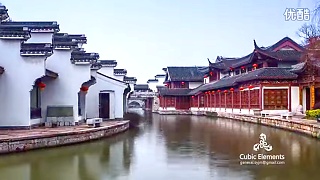At the Summer Palace in Beijing.
Filmed in October 2010.
[640],shadow=true,start=,stop=
Beijing, the capital city of China, is a vibrant metropolis steeped in history, culture, and modernity. Here's a brief overview of what you can expect as a tourist in Beijing:
Historical Landmarks:
The Great Wall of China: One of the most iconic structures in the world, the Great Wall is easily accessible from Beijing. Mutianyu and Badaling sections are popular among tourists.
Forbidden City (Palace Museum): A UNESCO World Heritage Site, this vast imperial palace complex was home to Chinese emperors for over 500 years. It houses numerous halls, courtyards, and historical artifacts.
Temple of Heaven: A masterpiece of Chinese architecture, this ancient temple complex served as a place of worship for emperors to pray for good harvests.
Summer Palace: A stunning ensemble of lakes, gardens, and palaces, the Summer Palace served as a retreat for emperors during the Qing dynasty.
Tiananmen Square: One of the largest city squares in the world, Tiananmen Square is flanked by important landmarks such as the Monument to the People's Heroes, the Great Hall of the People, and the Mausoleum of Mao Zedong.
Cultural Sites:
Beijing Hutongs: Explore the narrow alleyways and traditional courtyard residences of Beijing's historic neighborhoods. You can take a rickshaw tour or simply wander around on foot.
Beijing Opera: Experience traditional Chinese opera performances at venues like the Liyuan Theater or the Chang'an Grand Theatre.
798 Art District: A hub of contemporary art and culture, this former industrial area is now home to numerous galleries, studios, and cafes.
Modern Attractions:
Olympic Park: Visit iconic structures such as the Bird's Nest (National Stadium) and the Water Cube (National Aquatics Center) from the 2008 Beijing Olympics.
CBD (Central Business District): Marvel at the futuristic skyline of Beijing's modern business district, which includes landmarks like the CCTV Headquarters and the China World Trade Center Tower III.
Culinary Delights:
Peking Duck: Indulge in Beijing's most famous dish, crispy roast duck served with pancakes, scallions, and hoisin sauce.
Street Food: Explore the city's vibrant street food scene and sample local delicacies like jianbing (savory crepes), lamb skewers, and dumplings.
Practical Tips:
Transportation: Beijing has an extensive public transportation system, including the subway, buses, and taxis. However, traffic can be heavy, so plan your travels accordingly.
Language: While English is not widely spoken, especially outside tourist areas, many signs and transportation announcements are in English. It's helpful to carry a translation app or a phrasebook.
Weather: Beijing experiences four distinct seasons, with hot summers and cold winters. The best times to visit are spring (April to June) and autumn (September to October) when the weather is mild and comfortable.
Etiquette: Respect local customs and traditions, such as removing your shoes before entering someone's home and using both hands to pass or receive items.
Beijing offers a rich tapestry of experiences for tourists, blending ancient heritage with modern innovations. Whether you're fascinated by history, culture, or culinary delights, there's something for everyone in this dynamic city.
 Sunset over the mountains, BeiJing 北京
Sunset over the mountains, BeiJing 北京![A great film of the Great Wall north of Beijing, including `wild wall`, accompanied by great music (踏古 (Ta Gu) by Lin Hai, `Walking into Ancientry`, with Chinese lute (pipa)). We [mum, dad - videographer - and son and daughter, from Singapore] hiked 3 sections of the Great Wall in winter, without any guides after studying blogs and posts by fellow hikers. All these sections are different. From the unrestored GuBeiKou Great Wall where we were the only people around, to the wonderful JinShanLing, where the climb is steep and every direction gives you good photo opportunities, to the restored MuTianYu where we hiked in heavy snowfall. We stayed at local farmhouses on both nights, dined with the locals and hitched rides to nearby bath-houses. Temperature ranged from -5 deg C (day) to -12 deg C (night). Winter daybreak is at 7am and the sky becomes dark by 5pm so one has only 10 hours of daylight, so plan your travelling and hiking schedules carefully. This once-in-a-lifetime experience was captured on video and we would like to share it with you. The feelings just can`t be described - you need to experience it first hand. Take only memories, leave only footprints and kindness . . . A wonderful animation combining traditional Chinese painting and dance - don`t miss it ! 踏古-林海 作曲:林海 视频作者:中国传媒大学动画学院 Hiking the Great Wall 长城 of China in the snow](https://www.beijingbuzzz.com/b183.jpg)


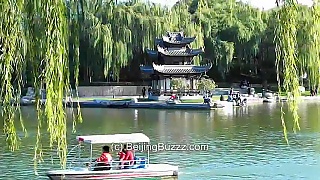
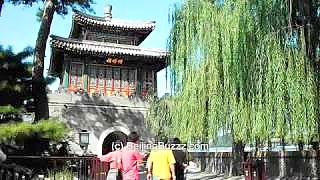
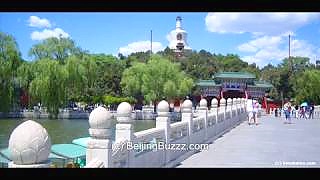
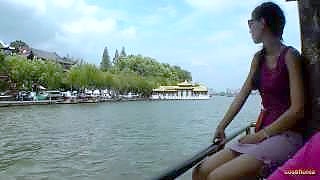

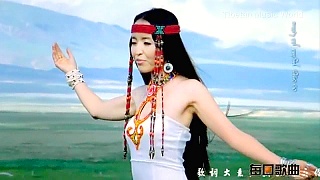

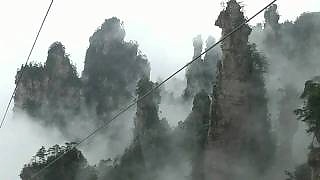
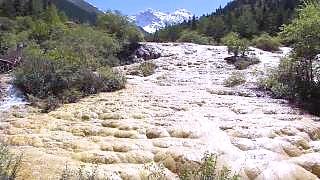
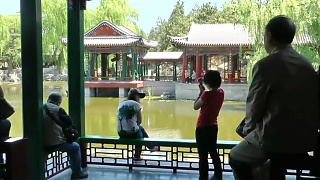
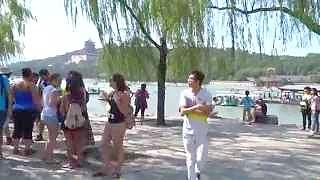
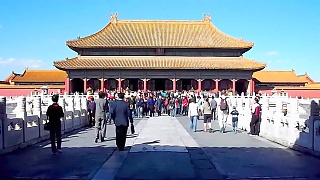



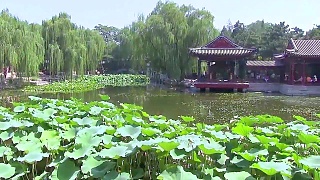


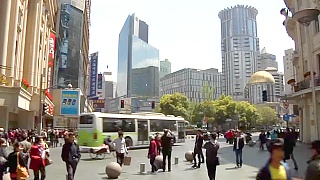




![PinYin - English : pronunciation. ~ is used where there are two sounds in one syllable. Ou[ch] means use the first sound of the word `ouch`; same sound as ow[l]. *** Greetings Nǐ Hǎo - Hello / Hi (literally, you good?) : nee how Zài Jiàn - Goodbye / bye : z~eye jee~ann HuānYíng (GuāngLín) - Welcome ! (You`ll often hear this when enter a restaurant) DaJia Hao ! - Hello everybody ! *** Introductions Nǐ - you / your : nee Wǒ - I / my : woh What is your name? - Nǐ jiào shénme míngzì? : Nee j~ou[ch] shen mer ming zuh? My name is ... - Wǒ de míngzì shì ... : Woh der ming zuh sh ... *** XièXiè - : Thanks : shee~air shee~air (second is a little softer/quieter) XièXiè Nǐ ! - Thank you! : shee~air shee~air nee! *** DuìBuQǐ - Excuse me / sorry : der boo chee BúKèQì - No problem / you`re welcome : boo ker chee Mei guan xi - No problem / you`re welcome : may goo~ann shee Qǐng - Please : ching Mei / MeiHǎo - Beautiful : may / may how *** Interations DuWei - That`s right : doo~way (quickly, and often said twice) Yes and no have no direct translations in Chinese, but the following will be fine is answer to common questions, although they are more like `to be` and `not to be` if translated literally; however, these are real colloquial uses. Bú shì - no : boo shh Bú shì can also be used in reply to `Thank you !` with the meaning `you`re welcome` / `no need to say` / `it`s nothing` Shì de - yes : shh der E. g. LàJiāo ? - lah jee~ou[ch] (chillies ?) : Shì de / Bú shì *** Wǒ - I / me : woh Nǐ - You : nee Tā - He / she : tah *** Shopping and restaurants Wǒ Yào - I want / would like I would like one of these : Wǒ yào Yī ge Zhè ge (woh yow ee guh jay guh) *** ZhèGe - This : jay guh NàGe - That : nay guh *** Yī Ge - One (of) : ee guh Lian Ge - Two (of) : lee~ann guh (Two as a simple number is Er, pronounced `are`) Sān Ge - Three (of) : san guh *** Duō Shǎo Qián? - How much? (price) : doo~or sh~ow[l] chee~ann? Zhège duōshǎo qián? - How much is this? : jay guh Nàgè duōshǎo qián? - How much is that? : nay guh Tài Guì Le! - too expensive! : tie gwee ler! *** nǐhǎo ma? - How are you? : nee how mar ? Hǎo De - ok : how der Hěn Hǎo - Good : hen how Bù Hǎo - Not good : boo how *** ShénMe? - When? : shen mer NǎLi? - Where : nah lee? Nǎr - There (gesturing) : nah Qĭng wèn - Excuse me (before asking a stranger a question) : ching wen Qĭng wèn, weì shēng jiān (zài) nă lĭ? - Where is the restroom? : Ching wen. Way sheng jee~ann z~eye (nah) lee? Qĭng wèn, dìtiě zhàn (zài) nǎ lǐ? - Where is the metro station? : Ching wen, dee tee~air z~eye (nah) lee? You might hear zai nar in norther China (e. g. BeiJing) *** 小 Xiǎo - Small : sh~ow[l] 大 Dà - Big : dah Tai - Too : tie *** Bin De - Ice-cold : bin der Lian De - Cold : lee~ann der Rè de - Hot : rer der Rè chá - hot tea : rer char Bīng píjiǔ - Cold beer : bing pee jee~oh *** La - Spicy : lah Bu La - not spicy : boo lah Xiao La - a little spicy : shee~ow[l] lah Da La - Very spicy : dah lah Tai La! - too spicy! : tie lah! *** Noodles - Miàn : mee~ann Dumplings - JiǎoZi : jee~ow[l] zuh Rice - MiFàn / Fàn : mee fan / fan Eggs - JīDàn : jee dan Beef - NiúRòu 牛肉 : nee~you row Lamb - YángRòu 羊肉 : yang row Chicken - JīRòu 鸡肉 : jee row Pork - ZhūRòu 猪肉 : joo row Fish - YúRòu 鱼肉 : yoo row Tofu - DòuFu 豆腐 : doh foo (See BeijingBuzzz`s food cheat sheet for much more) (Wo) Chī bǎole! - (I`m) full! : Woh ch b~ou[ch] ler! (Ni) Chī bǎole ma? - (Are you) full? : (Nee) ch b~ou[ch] ler maa? Ma is appended to change a statement into a question. *** ZhōngGuó - China : jong goo~woh YīngGuó - England : ying goo~woh MěiGuó - America : may goo~woh ZhōngWén - Chinese nationality : jong ren YīngWén - English nationality : ying ren *** Hótel - Hotel FànDiàn - Hotel / Restaurant : fan dee~ann Wǒ Bù ZhīDào - I don`t know : woh boo juh~dow Tīng Bù Dǒng - I don`t understand : ting boo dong ZhèGe Duōshǎo Qián? / DuōShǎo Qián? - How much is this? : doo~or sh~ow[l} chee~ann? Tài guìle ! - Too expensive ! : tie-gwee lah ! Wo Yao ... - I would like ... : woh yow ... Wǒ Yào ZhèGe - I want this one : woh yow jay~guh *** 5 yuan (kwai) / 2 pieces (items) 5元 / 2个 or 5元 2个 8 折 (bā zhé), which directly translates as `8 discount`. This means that the discounted price is 80% of the original price (20% off). 人 Rén - Person : ren 5元 / 2人 - 5 yuan for 2 people *** For toilet doors / WCs : 男 - Man 女 - Woman *** BúShì - No : boo shh ShìDe - Yes : Shh der Hǎo de - Okay : how der MéiYǒu - none / out of stock : may~oh *** Wǒ ài ... - I love ... : woh eye ... - I love this! : woh eye jay-guh! Wǒ ài ZhōngGuó - I love China : woh eye jong goo~woh *** Hǎo Chī - Delicious (literally good eat) : how ch Bú Hǎo Chī - Not tasty : boo how ch One can think of `Bú` as meaning `not` *** Wǒ Bù LiǎoJiě - I don`t understand : woh boo lee~ow[l]~jee~air *** Chi - eat : ch Wǒ Xiǎng ... - I would like ... : woh shee~ang ... Wǒ Xiǎng Chī ... - I would like to eat ... : woh she~ang ch ... *** Directions Bei - North : bay Nan - South : nan Xi - West : shee Dong - East : dong *** DìTiě - Subway train : dee tee~air Dìtiě nali ma? - Where is the subway? : dee tee~air nah~lee ma Zhan - Train station : zahn Men - gate : men Yuan / kwai - rmb (currency) : yoo~ann / kw~eye (more common) Gong yuan - Park : gong yoo~ann *** KāFēi - Coffee : kah fay Chá - Tea : chah kěLè - Cola : ker ler PiJiou - Beer : pee jee~oh Shui - Water : shway Wo yao liang ge pijiou liande - I would like two cold beers : woh yow[l] lee~ann guh pee jee~oh lee~ann der *** Jia Yo! - Let`s go! / Go! (encouraging) : jee~ah yoh! Wǒ Bù Shuō Hànyǔ / ZhōngWén - I don`t speak Chinese (huh?!) Or simply Bù ZhōngWén : boo jong wen *** Numbers Numbers are easy (there are finger position numbers too, but that`s not so easy) : 1 - Yī : ee 2 - Èr : are 3 - Sān : san 4 - Sì : si (the sound is the first half of `soot`) (short sound) 5 - Wǔ : woo~oh 6 - Liù : lee~oo 7 - Qī : chee 8 - Bā : bah 9 - Jiǔ : jee~oo 10 - Shí : shhh (longer sound) Example of 11 - 99 : 73 - Qi Shí Sān (7x10) + 3 : chee shhh san (7 10 3) 70 - Qi Shí (7x10) : chee shhh (7 10) 100 - Bǎi : buy Example of 101 - 999 : 357 - Sān Bǎi Wǔ Shí Qī (3x100 + 5x10 + 7) : san buy woo~oh shhh chee (3 100 5 10 7) 300 - Sān Bǎi (3x100) : san buy (3 100) One small complication - two (of) - rather than the number two) is liǎng ge : lee~ang ger *** Cheers! - GānBēi! : gan bey! Simple Chinese language phrases to enhance your China trip (pinyin and pronunciation)](https://www.beijingbuzzz.com/choral3.jpg)
